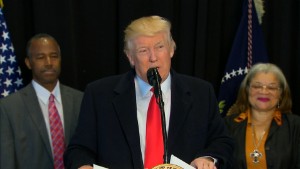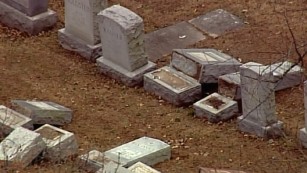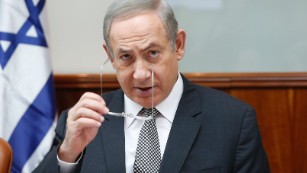Trump condemns anti-Semitism but can't stop questions about his motives
President Donald Trump finally delivered an unequivocal condemnation of anti-Semitism Tuesday in the wake of bomb threats against Jewish Community Centers, winning him praise even from critics.
But scores of people still took issue with how long the statement took. It left many wondering just why he delayed taking a seemingly obvious moral course for a president in the face of bomb threats at 48 JCCs in 26 states in January and rising fears of widening nationwide anti-Semitism after additional incidents this month.
Former Republican Sen. Rick Santorum, a CNN senior political commentator, said he was "befuddled" over why Trump had not spoken out before.
Jewish cemetery vandalized; headstones damaged
"This is a President who to me is very much a mensch," Santorum told CNN's Wolf Blitzer on Tuesday, using the Yiddish term for a person of decency and integrity. He also noted Trump's support for Israel and his three Jewish grandchildren.
Trump's missing voice on the issue effectively created a vacuum that allowed critics to lay fresh charges of bigotry against him and had even his defenders wondering why the President seemed unwilling to address the issue.
Trump had several opportunities in news conferences last week to speak out against threats that are causing deep anxiety within Jewish communities and failed to do so. Moreover, he brusquely shut down an Orthodox Jewish journalist on the issue in one of the most jarring encounters of his presidency.
That confrontation, the new spate of threats against JCCs, the desecration of a Jewish cemetery in St. Louis and growing political pressure for Trump to speak out -- including from his defeated presidential rival Hillary Clinton -- help explain the timing of his remarks.
It was fast becoming politically damaging for Trump not to adopt a stern, public line against the incidents.
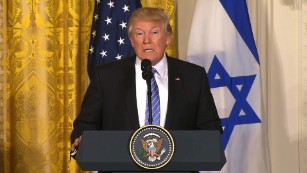
Trump: UN treats Israel 'very, very unfairly'
"The anti-Semitic threats targeting our Jewish community and community centers are horrible and are painful and a very sad reminder of the work that still must be done to root out hate and prejudice and evil," Trump said Tuesday during a visit to the National Museum of African American History and Culture.
The President said that his tour was "a meaningful reminder of why we have to fight bigotry, intolerance and hatred in all of its very ugly forms."
Trump won kudos for his remarks.
"What he said just recently is what I would hope the President of the United States would do," Democratic Maryland Sen. Ben Cardin said on CNN on Tuesday. But he added, "He was slow to getting to this issue."
Indeed, Trump's clear words were also a reminder of what had been missing -- and are unlikely to satisfy Trump's opponents. Particularly after his missteps exacerbated their concerns about his true interest in stamping out anti-Semitism.
For one thing, Trump's extreme sensitivity to criticism has led him to equate questions about racial and religious prejudice in general as a suggestion that he might somehow be personally guilty of such sins, obscuring the larger issue and the depth of his opposition to expressions of prejudice.
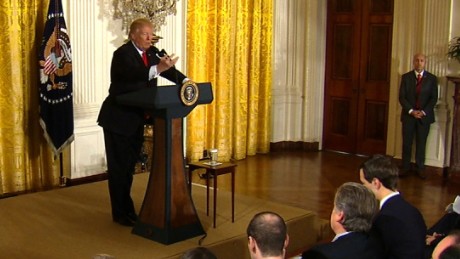
Trump: I am the least anti-Semitic person
When Jake Turx of Brooklyn-based Ami magazine asked Trump last week about the rise in anti-Semitic acts, the President immediately jumped to the conclusion he was being accused of bigotry, despite the fact the reporter took steps to assure him that was not the case.
"Quiet, quiet, quiet," Trump said as the reporter tried to explain his question.
"I hate the charge, I find it repulsive," Trump said.
The exchange was a fresh indication of how the President tends to personalize many issues, ranging from Russia or questions about the legitimacy of his election win and see them as a reflection of his own reputation.
It's not as if he needed to wait for his visit to the museum to make his feelings clear. No president in modern times has kept up such a torrent of condemnation on the long list of people, events and issues that irk him, often on Twitter but also in frequent photo ops with journalists.
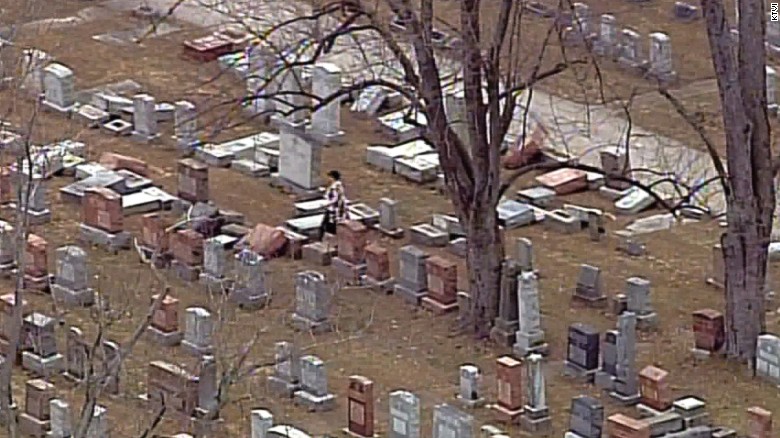
Police are investigating damage to headstones at the Chesed Shel Emeth Society cemetary in Missouri.
So his failure to speak out forcefully about anti-Semitism had perplexed Washington.
Trump critics suggested that the delay was in keeping with what they see as the President's consistent failure to condemn bigotry, especially among extremist groups attracted by his campaign rhetoric. He was hit with criticism last year for not promptly repudiating key Ku Klux Klan figure David Duke, though Trump did later do so.
More recently, Trump critics pointed to the administration's immigration ban on the citizens of seven predominantly Muslim countries that was stayed by a federal court as evidence of prejudice in the West Wing.
The Anne Frank Center for Mutual Respect said Trump's statement was merely "a Band-Aid on the cancer of anti-Semitism that has infected his own administration."
"His statement today is a pathetic asterisk of condescension after weeks in which he and his staff have committed grotesque acts and omissions reflecting anti-Semitism, yet day after day have refused to apologize and correct the record," said Steven Goldstein, the center's executive director.
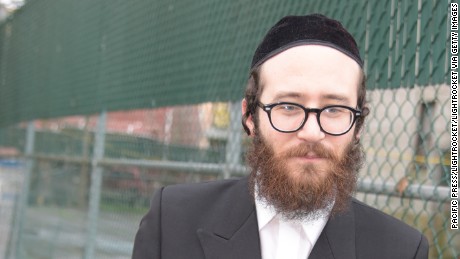
Jewish reporter still hopeful about Trump
The anti-Semitism controversy also appears to reflect the growing pains of a new administration and the struggles evident in Trump's transition from rabble-rousing candidate to president.
Trump and his team -- many of whom are outsiders in his own image -- lack deep governing experience, and already seem to betray a bunker mentality that hurts their ability to navigate fast-growing political challenges.
"He took way too long" to respond, said former Democratic congressman Steve Israel, now a CNN commentator, who stressed he was not accusing Trump of anti-Semitism but wanted him to speak out more prominently against it.
"The President not only has the bully pulpit, he has the moral high ground," Israel said, and cast doubt on the political savvy of the White House. "This is an administration that seems to be good about denying itself its own lay-ups. This should have been said earlier. It should have been easy."
Netanyahu, Trump rekindle US-Israel relationship
Israel and others called on Trump to take real steps to reinforce his remarks.
The Simon Wiesenthal Center urged Attorney General Jeff Sessions to establish a special task force to apprehend those behind the bomb threats and for Trump to "outline his administration's plan to combat surging anti-Semitism."
At the White House, spokesman Sean Spicer did not offer specifics about what Trump would do policy-wise. But he promised the President would "speak very, very forcefully against those who are seeking to do hate or to tear people down."
He also complained about those continuing to criticize the President on this front.
"It's ironic that no matter how many times he talks about this, that it's never good enough. Today I think was an unbelievably forceful comment by the President ... but I think that he's been very clear previous to this that he wants to be someone that brings this country together and not divides people," Spicer said.
News Courtesy: www.cnn.com

